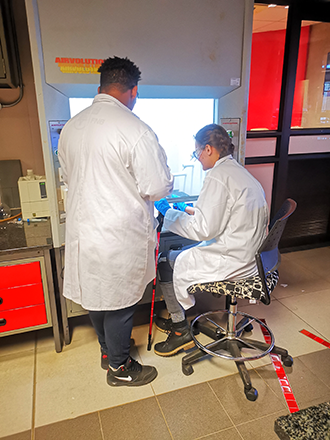College of Science, Engineering & Technology
Unisa bridging the gaps
The Department of Chemistry in the School of Science, College of Science, Engineering and Technology at the Science Campus, held Chemistry practical sessions from 3 June to 20 September 2024. During these practicals, the Department of Chemistry had an opportunity to interview Amy Hughes from Modderfontein, who is completing her second/third-level modules as part of her studies towards a BSc Chemistry degree.

Amy Hughes (seated) with her laboratory partner
Hughes has struggled to walk since being diagnosed with arthritis, which causes pain and inflammation in all of her joints, making it difficult for her to stand for extended periods. According to Hughes, her health is unpredictable, so she chose to study at Unisa because of its openness and flexibility, allowing students to manage their time to study and to engage with module sites anytime.
Hughes went on to say that she has had arthritis since an early age and that, despite her physical limitations, she is determined to excel in her laboratory practicals. She emphasised that the laboratories at the Science Campus are easily accessible and during her practicals, she was provided with a comfortable chair that allowed her to complete her laboratory work without any physical challenges.
Hughes made use of assistive tools during her practicals, including a walking stick and knee braces, to help with her balance. The practicals, she said, were inclusive and accommodating to students with physical challenges because all students were assigned laboratory partners. This aided her greatly because she uses a cane and carrying chemicals herself would have been difficult. The only challenge she faced was fatigue when she returned home, but otherwise, doing her chemistry practicals at Unisa turned out to be fulfilling and enjoyable.
In the same interview, we also had the opportunity to meet Dalva Macuacua, a passionate chemistry student from Mozambique, who joined the conversation and shared her experience with Unisa's flexibility and global connections. Macuacua chose Unisa because other universities required extensive documentation, which she could not afford, whereas Unisa required only her passport and high school results for enrolment.
Enrolling in an open-distance institution for the first time was difficult, according to Macuacua, who has adapted to Unisa systems and appreciates the fact that practicals are held on campus, making it easier for her and her fellow students to understand the mechanisms and reactions taught in the theory classes.
The experiences shared by Hughes and Macuacua demonstrate that, at Unisa, academic dreams can be realised regardless of health challenges, and that financial difficulties associated with studying across borders are not a barrier to educational success.
Prof Nomvano Mketo, Chair of the Chemistry Department, was delighted to hear about these compliments from the chemistry students, as they reflected on the College of Science, Engineering and Technology and Unisa at large for its commitment to equity and cultural diversity. "This shows that Unisa is about academic excellence and student support irrespective of physical challenges and disadvantaged backgrounds," said Mketo. "As the 'University of the People', Unisa will continue to provide solutions to student challenges."
* By Busisiwe Manala, Project Talent Link, Department of Chemistry, College of Science, Engineering and Technology
Publish date: 2024/11/25

 Unisa co-hosts G20 community outreach in the Eastern Cape
Unisa co-hosts G20 community outreach in the Eastern Cape
 Unisans gain membership of prestigious science academies
Unisans gain membership of prestigious science academies
 Advocating for disability transformation through servant leadership
Advocating for disability transformation through servant leadership
 Unisa Press continues to illuminate the publishing space
Unisa Press continues to illuminate the publishing space